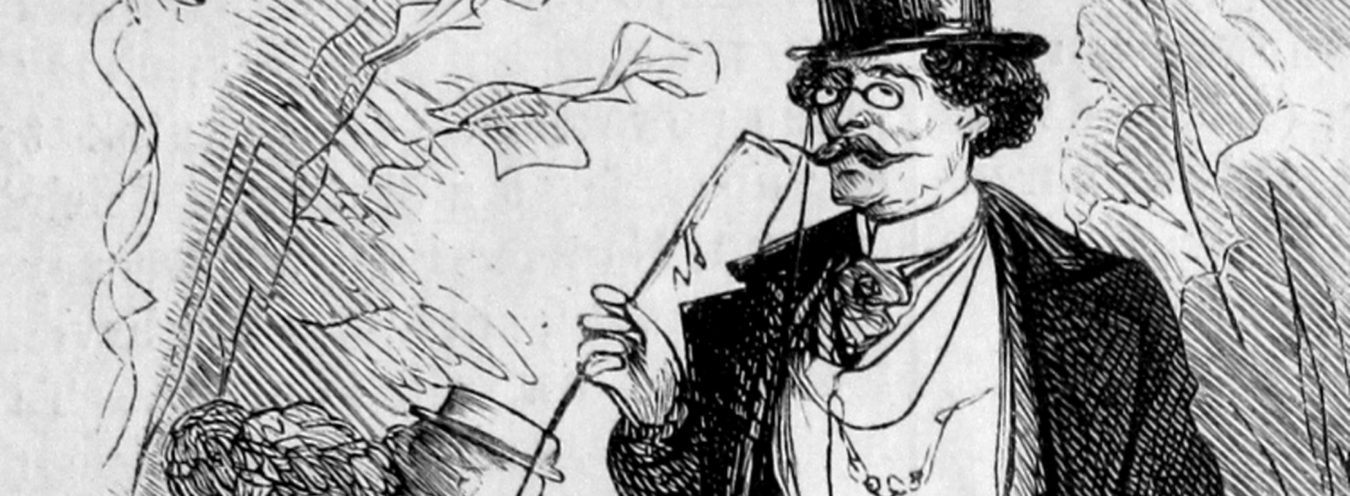
Szlangbaum, Henryk, Junior
Prus constructs the character of Henryk Szlangbaum both to illustrate the failure of assimilation and to present a study of a transformation of a Pole of the Hebraic persuasion into a cunning and cynical Jew, who constitutes a threat to Polish national identity. Henryk Szlangbaum embodies the worst fears of Polish anti-Semites.
In the past, Szlangbaum was called Szlangowski, and after the January Rising was sent to Siberia together with Wokulski and Doctor, which is an allusion to his former patriotic attitude. Prus caricatures his attempts at assimilation: he celebrated Easter and Christmas, and I am sure the most pious Catholic did not eat as much sausage-meat as he. Significantly, Szlangowski did not eat sausage-meat with garlic because he couldn’t abide the traditionally Jewish spice. He worked in a shop owned by Christians even though he was offered better pay by Jews. When he was fired, he hesitated about asking Wokulski for help, as they might say of me that a Jew will creep in anywhere. Wokulski takes him in, but the clerks do not like him and harass him, as he has the misfortune to be a Hebrew. The growing hostility towards Jews stops Szlangbaum’s attempts at assimilation. He confesses to Rzecki that he was about to convert but he realised that to sever his ties with the Jewish community would mean living in a void: he would be rejected both by Jews and by Christians, who would never accept him. This cultural and social rationale, however, is closely connected with material motivation. He counts on inheritance: ‘Today, I understand that as a Jew I am only despised by Christians, but as a convert I’d be despised by Christians and Jews alike. After all, I must live somewhere. Anyway,’ he added, more quietly, ‘I have five children and a rich father, whose heir I am.’ At first, Szlangbaum is Small, dark, bent, unshaven – in a word, you would not give tuppence for him when he sits at the cash desk. His humped posture and dwarf size are complemented with red eyes and a face full of rancour. His looks ideally match the stereotypical physiognomy of a Jew. He is humble, quiet, conscientious at work, but also proud: he courageously defends his father’s honour, when Łęcki calls him a wretched usurer, a wretched Jew, and a scoundrel.
Szlangbaum’s transformation begins with rumours that Jews either have already bought or are going to buy Wokulski’s shop. As a result of these, Ignacy Rzecki feels threatened, and he has nightmares that the Jews had really bought our store, and that I, so as not to starve to death, was going around the courtyards with a barrel-organ on which was written: ‘Take pity on a poor old ex-Hungarian officer.’ The first signs of Szlangbaum’s change appear in his behaviour and look: whereas he used to be hunched, bent, and humble, now he raises his head (the spatial metaphors in his depictions are loaded with significance). As Rzecki notices, to his surprise, I looked up, there he was, rubbing his hands, his moustache twirled up, head high … And I thought to myself ‘Has he gone mad, or what?’ But he bows, with his head high. Szlangbaum changes into an arrogant Jew, turns up his nose, demonstrates his authority in the shop, sacks old clerks and hires Jews instead. He is humble to the wealthy, but shows contempt, anger towards the weak and subordinate, from whom he demands respect and obedience. Szlangbaum’s actions are an anti-Semite’s nightmare come true. Step by step, he takes over Polish property: first Wokulski’s shop, then his trade company, and finally All his property, from the furniture to his carriage and horses. Moreover, it is in his nature to be disloyal towards Poles. In public, Szlangbaum behaves in a friendly way towards Wokulski, but behind his back he spreads gossip about his alleged keeping [of] that … that Stawska, in reaction to which Rzecki spits at his feet. The contrast between the former respect for Szlangbaum (Szlangbaum is a decent citizen in the fullest sense) and later contempt is glaring. Szlangbaum, however, goes even further: he tells the new clerk Gutmorgen to spy on Rzecki during his beloved moments of reverie spent with shop puppets. This is the last straw for Rzecki’s humiliation, and it directly leads to his death.
The Journal of the Old Clerk offers a synthesised account of Szlangbaum’s metamorphosis: Previously he was mild, today he’s arrogant and contemptuous; previously he kept silent when an injury was done him, today he quarrels for no reason. Previously he called himself a Pole, today he flaunts his Jewishness. Previously he even believed in nobility and disinterestedness, but now he talks of nothing but money and social contacts. The novel ends is a meaningful image, which both expresses Prus’s pessimism and the increasing anti-Semitic fears regarding the Jewish supremacy in Poland. Standing over Rzecki’s body, Szuman rhetorically asks, ‘Who will be left here in the end?’ ‘We will!’ replied Maruszewicz and Szlangbaum, simultaneously. A cheating rascal and a Jew are the last ones left.
→ Anti-Semitism; → Szuman, Michał; → Szlangbaum, Senior; → Jews;



